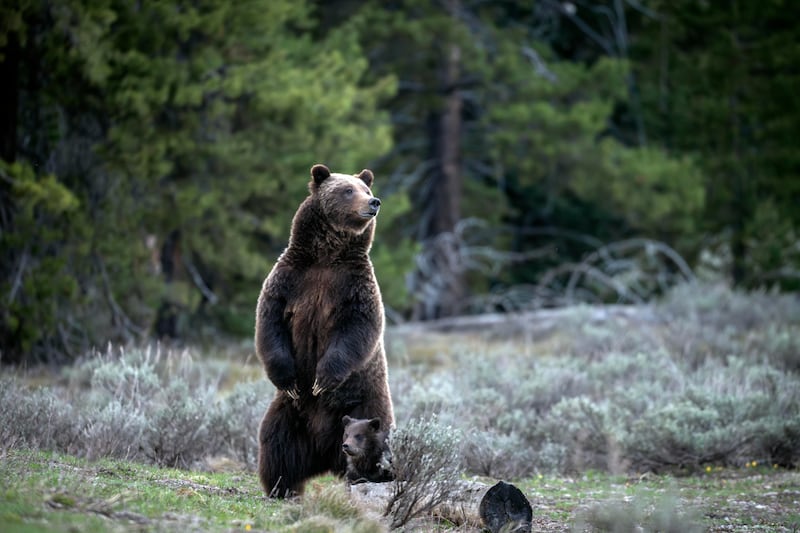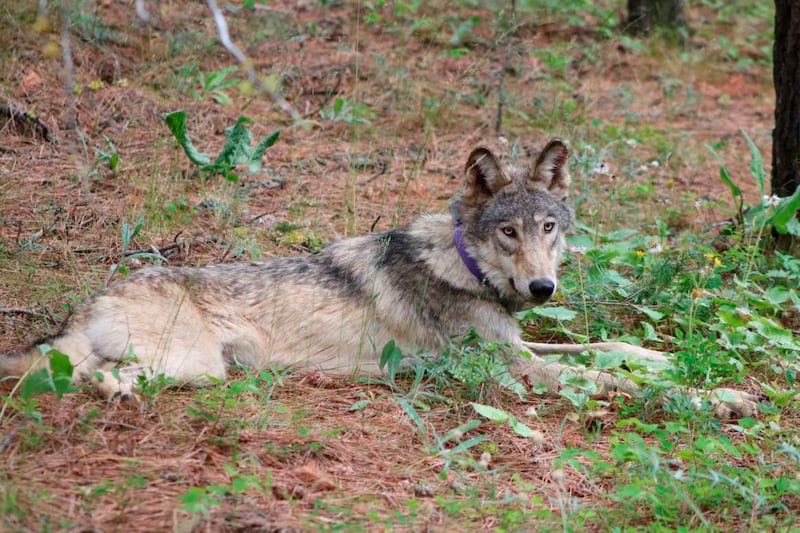- Bills in Congress seek to remove for grizzly bears and gray wolves from the Endangered Species Act.
- Nationwide polling shows overwhelming support for keeping federal protections for the predators.
- Three-fourths of conservatives support maintaining endangered status for grizzles and wolves.
Congress is considering three separate bills that would delist grizzly bears and gray wolves from the Endangered Species Act.
Two are stand-alone pieces of legislation to delist the predators and remove protections — one for wolves and the other for grizzlies — that are working their way through both the House and Senate.
The other is a Department of the Interior funding bill in the House that includes riders that would delist bears and wolves.
Grizzly bears are listed as threatened under the Endangered Species Act. Gray wolves’ are listed as threatened in Minnesota and endangered in the remaining states.
For proponents of the legislation, the protections in place for those animal populations and their habitats have worked well. So well, in fact, that they believe the government needs to update how the predators are managed in the West.
“It is time for Congress to step forward,” said Rep. Harriet Hageman, R-Wyo., the sponsor of the bill to delist the grizzly in the Greater Yellowstone Ecosystem spanning 22 million acres in Wyoming, Montana and Idaho.
“We do not need to do what courts do, which is ignore the science, ignore the history, ignore the purpose of the act, etc. We can step in and delist, and that’s what the purpose of this bill is.”
But new polling for researchers at Michigan Technological University and Ohio State University shows that those efforts by Congress are not in line with the majority of Americans.
Overall, the surveys found that 85% of Americans want to maintain protections for grizzlies and 78% want to do the same for wolves. In the poll taken about gray wolves, the authors found that for every person who strongly opposes maintaining protections, there were nine who strongly support keeping them.

“The results of this survey really demonstrate what we already knew that the vast majority of Americans, including those who live in rural areas in states with wolves, highly value them and want them protected,” said Amanda Wight, senior program manager for wildlife protection at Humane World for Animals, an advocacy group that supported the study alongside the U.S. Department of Agriculture.
“Americans understand that wolves need those protections in place in order to fully recover and ... it’s clear that the people driving the negative narrative toward wolves represent a very vocal, but very tiny group of people.”
The results reflect national opinion as well as people who live in the same regions as the predators. The surveys sought out local sentiment for the states most impacted by the legislation and predator populations.
“The results that we got were pretty jaw-dropping and weighted heavily towards the rural residents of Idaho, Montana, and Wyoming,” said Wendy Keefover, the senior principal for carnivore protection for Humane World for Animals.
The authors of the studies, professor John A. Vucetich at Michigan Technological University and professor Jeremy T. Bruskotter at Ohio State University, concluded that “the data indicate that there is strong public support for continuing to protect grizzly bears (and gray wolves) under the U. S. Endangered Species Act.”
What are the bills being considered?
The House is considering the Grizzly Bear State Management Act, numbered as H.R. 281 in the House and S. 316 in the Senate. Both are sponsored by Republican Wyoming legislators — Hageman and Sen. Cynthia Lummis.
The bill would delist grizzlies in the Greater Yellowstone Ecosystem and then remove the potential for any judicial review.
The other piece of legislation is called the Pet and Livestock Protection Act, numbered as H.R. 845 in the House and S.1306 in the Senate. This law would remove the gray wolf from the endangered species list without any boundary limitations — meaning that it would apply nationally — rather than a specific geographic area. It also stipulates that the law would not be eligible for judicial review.
An Interior Department appropriations bill also carries a number of stipulations regarding wolves and bears.
The grizzly bear legislation requires the Interior to reissue the final rule that protects the animals in that region no later than 180 days after the law is passed. For the wolves portion of the bill, the enactment window is 60 days.
That the measures would prevent judicial review, essentially blocking potential efforts to overturn them should they become law, is a big concern for Keefover.
“We have three branches of government, and Congress is gonna take away one of those — a democratic institution — so, that’s just patently unfair," she said.
What else did the study find?
The survey research company Qualtrics conducted the surveys for the two researchers.
The grizzly bear poll conducted last January had 1,434 respondents and an overall margin of error of plus or minus 1.9 percentage points. The gray wolf poll in August had 1,079 respondents and an overall margin of error of plus or minus 2.5 percentage points.
The overall survey results did not change demonstrably when responses were filtered for political affiliation, rural or non-rural Americans and occupation.
If anything, they stayed almost entirely the same with the vast majority of conservatives, as well as folks from rural communities also wanting protections to remain in place for both grizzly bears and gray wolves.
The grizzly bear study found 78% of respondents in Wyoming, Montana and Idaho want to keep the animals on the endangered species list.
When separated out further, 81% of conservative Americans want bears to maintain their endangered status. Of those that identified as hunters, it was 82%. For farmers and ranchers, the number was 82%.
In the study regarding wolves, the numbers were only slightly different.
In most of the states that have gray wolf populations, such as Michigan, Wisconsin, Minnesota, Washington, Oregon, Idaho, Montana, and Wyoming, 75% of respondents favor keeping protections.
When the wolf survey data is further broken out, the researchers found that among those who strongly identified as a farmer or rancher, 79% supported gray wolves keeping their protections.
The findings suggest to Wight and Keefover that there is a disconnect between elected officials and the wants of the majority of folks within their districts or at least in the places that interact the most with those large predators.
“We already knew that delisting goes against sound science, and now the results of this scientific survey clearly demonstrate that removing protections is not supported by the American people either, including those who one might expect to have more negative attitudes toward the species,” Wight said.
“It’s really crucial that decision makers start listening to their constituents.”


